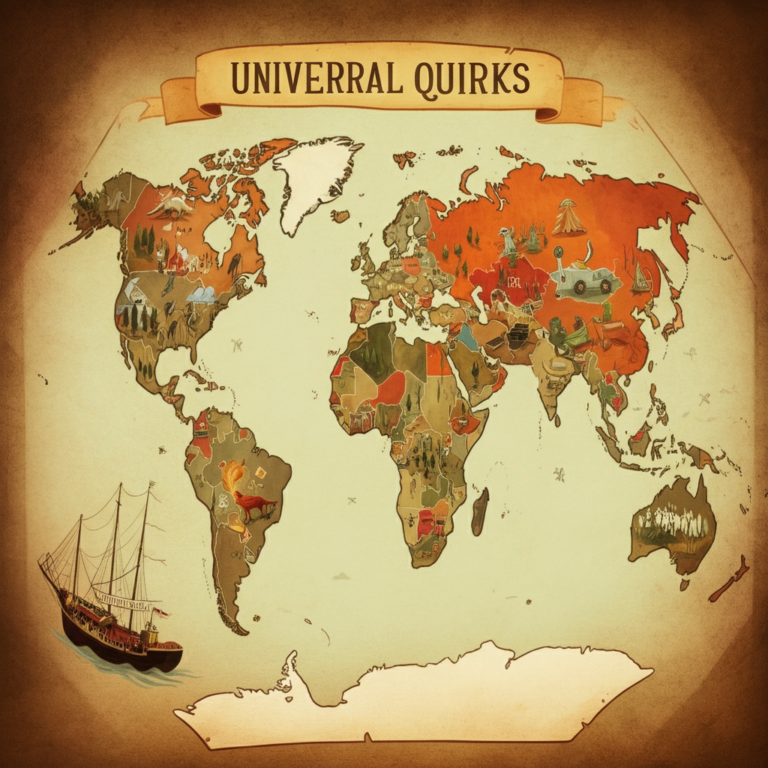The globe is a fascinating patchwork of nations, each with its unique quirks and characteristics. While you may know the basic facts about popular tourist destinations, countless unusual and lesser-known details often fly under the radar. Understanding these fascinating tidbits can deepen your appreciation of the rich cultural tapestries that weave our world together.
From a country without an official capital to a place that has more sheep than people, the world is full of surprises. Below is a list of 15 unusual facts from countries around the globe, guaranteed to engage the curious globe-trotter in you.
1. Australia Has More Kangaroos Than People
Australia, known for its unique wildlife, is home to around 50 million kangaroos—double the size of its human population. This astonishing ratio is a reminder of the country’s rich biodiversity. It also explains why kangaroo meat has become a sustainable option for human consumption.
Fun Fact:
Kangaroo crossings are a common sight on Australian roads, with warning signs alerting drivers in rural areas.
2. South Korea Holds Annual ‘Kimchi Fridges’ Sales
Kimchi, a staple in South Korean cuisine, is so integral to life that households have special “kimchi fridges” to store the fermented dish appropriately. Every year, retailers hold promotions specifically for kimchi refrigerators as the winter kimchi-making season (called “Kimjang”) begins.
Fun Fact:
South Koreans consume approximately 40 pounds of kimchi per person annually.
3. Sweden Is a Cashless Society
Only 1% of Sweden’s GDP is in physical cash. Many businesses don’t accept cash at all, relying exclusively on digital payments like Swish, a local mobile platform developed by Swedish banks.
Why It Matters:
Sweden’s shift to digital payments serves as a case study for countries moving toward fully cashless economies.
4. Singapore Bans Chewing Gum
Chewing gum has been banned in Singapore since 1992, primarily to maintain the country’s impeccable cleanliness. Exceptions apply to medicinal gum, which requires a prescription.
Why the Rule Exists:
Before this law, discarded gum caused damage to public transport systems, prompting the government to take drastic measures.
5. Iceland Has No Mosquitoes
Despite having lakes and damp environments, Iceland is entirely mosquito-free. Experts believe this is due to the country’s unique climate and ecosystem, which prevents mosquitoes from completing their lifecycle.
Fun Fact:
Icelanders often joke that their worst pest is the cold Arctic wind!
6. Bhutan Measures Success by Gross National Happiness (GNH)
Unlike most countries that measure progress via GDP, Bhutan gauges its prosperity through Gross National Happiness, focusing on well-being over economic success.
Core Pillars of GNH:
GNH incorporates sustainable development, environmental conservation, cultural preservation, and good governance.
7. Canada Has More Lakes Than the Rest of the World Combined
Canada is home to over 2 million lakes, making up roughly 20% of the world’s freshwater supply. Lake Superior alone holds more water than all the rivers on Earth combined.
Fun Fact:
The lesser-known Lake Manicouagan in Quebec is a circular lake formed by a 200-million-year-old meteorite impact.
8. Bolivia Has Two Capitals
Bolivia is an example of a country with two functioning capitals. Sucre is the official constitutional capital, while La Paz serves as the seat of government and executive power.
Why This Split Exists:
The dual-capital system balances historical significance (Sucre) and operational practicality (La Paz).
9. Japan Has Vending Machines for Almost Everything
With one vending machine for every 23 people, Japan boasts over 4 million machines. Beyond snacks, they sell everything from fresh eggs to umbrellas, and even hot meals.
Fun Fact:
Japan’s obsession with vending machines stems from its high population density and space efficiency.
10. There’s a Mysterious Door in Tajikistan’s National Library
Tajikistan’s National Library in Dushanbe features a door that opens to nowhere. It was installed with the intention of a future extension.
Why It’s Significant:
The door has become a quirky tourist attraction, symbolizing optimism for growth.
11. New Zealand Has More Sheep Than People
New Zealand is famous for its sheep population—a whopping 25 million sheep compared to just over 5 million people. That’s five sheep per person!
Fun Fact:
Sheep farming is integral to New Zealand’s economy, particularly for wool and lamb exports.
12. Finland Hosts the World Wife-Carrying Championship
Yes, it’s exactly as it sounds. Finland hosts an annual competition where men carry their wives through an obstacle course. The winner receives their partner’s weight in beer.
Origins of the Race:
The event pays homage to a legend where men “carried” potential brides from villages. Today, it’s all in good fun.
13. Monaco Is Smaller Than Central Park in New York City
Monaco’s total area is just 0.78 square miles, making it smaller than Central Park (1.32 square miles) in New York City. Despite its tiny size, it remains one of the wealthiest countries in the world.
Fun Fact:
One-third of Monaco’s residents are millionaires, thanks to favorable tax policies and a glamorous lifestyle.
14. Italy Has a Fountain That Dispenses Wine for Free
Located in Abruzzo, Italy, the famed “Fontana di Vino” offers free red wine to locals and pilgrims walking the ancient Cammino di San Tommaso route.
Why It Exists:
The fountain is a gesture of hospitality, encouraging camaraderie among visitors.
15. North Korea Uses a Different Calendar
North Korea follows the Juche calendar, which began in 1912, the birth year of Kim Il-sung. It’s currently 112 Juche in North Korea.
Cultural Insight:
The calendar reflects the country’s ideological commitment to its founding principles.
Explore More World Wonders
The world’s countries are infinitely fascinating, each offering fun, peculiar, and surprising qualities. From doorways to nowhere in Tajikistan to Iceland’s mosquito-free ecosystem, these facts illustrate the diversity that makes our planet endlessly captivating.
Traveling soon? Keep these tidbits in mind the next time you cross borders—they make for great conversation starters!




















0 Comments